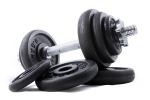- FreeTrainers.com Forums
- General Fitness & Exercise
- need help: knowledge
Group: General Fitness & Exercise
Created: 2011/12/31,
Members: 383,
Messages: 54581
Various general exercise related discussions. Find out what it takes to reach your fitness goals through daily effective exercise. With so many options we try to find out what works best.
Join group
need help: knowledge

Kasper
Posts:
153
Joined: 2002/08/30  |
2003/01/18, 11:42 PM
does anyone know of the best way to stimulate your mind, learn better and faster etc... btw does anyone know of anygood sites to learn best in like math(any kind like geo,algebra 2), or science(chemistry,bio) etc.. |
|
| |

Philia2
Posts:
4,078
Joined: 2001/10/19  |
2003/01/19, 01:48 AM
To be able to think logical and faster you need training. Our minds are amazing, we can do soooo many things you just need to turn on the engine! Sorry I don't know any sites but why not make a search on Google? (and tell us the results!) -------------- - Nina :o) Les Victoires éternelles sont celles du coeur. |

erirvine
Posts:
196
Joined: 2002/11/20  |
2003/01/19, 02:51 AM
You need to remember to eat properly if you want to learn, the brain needs constant feeding to keep active. Also if you get hungry your brain makes you become preoccupied with eating. Luckily eating lots of smaller meals (5-6 a day) is also perfect for boosting metabolism for fat loss and, and for constant protein supplies needed for muscle growth.Firstly find your natural time to work; just like training most people have a time when they are able to concentrate better. Personally I find I work best early mornings, though many of my friends find very late nights work for them. Also find out if and what music helps you work, I need either complete silence (v. hard to find) or a familiar background CD to block out distractions. And don’t underestimate the value of sleep get at least eight hours a day (or night ;o) ) especially before an exam. If you have lots of work over a period (say revision) to do try to break it up into manageable chunks, and work on a timetable, say quantum chronodynamics on Monday and Thursday mornings, electro-weak gauge theory on Thursday afternoons and Saturday mornings – ect. And find out a syllabus, know exactly what you need to know and what you don’t. If you still have the option turn up to EVERY class, I remembered stuff in exams from classes I was asleep in – how I have no idea! Generally work for an hour or so then take a break; in academic circles these are normally coffee breaks, but you need to make sure you don’t turn into a caffeine fiend. The best way to lean maths is by doing examples; find someone who can tutor you by giving and marking examples (parent / older sibling). Alternatively get a dedicated question book or photocopy the questions and answers from several different books. I find facts are easily learnt my making abbreviated notes (about 1 side long) then copying them out (as much from memory as possible) several times trying to compact them as much as possible each time (till you end up with a few dozen words). Talking about books, find a good one that teaches the material in a manner that is clear for you and roughly matches the syllabus (not necessarily what the teacher recommends). Almost everyone finds real books easier to read (and you can highlight ect). Though a general quick reference (better for reminding you of things you already know, or little bits you are stuck on) try http://mathworld.wolfram.com/ I use its search facilities quite a lot (and its totally free). Remember training or other hobbies will help you relax but if you are not careful it might become a displacement activity. You should know that for your bio! But if not a displacement activity is where a creature is trying to achieve a goal vital for survival (in your case school) due to been thwarted in this the start to focus on a totally unrelated (and often pointless) activity (going to the gym). Saying that most of the real hard workers at my school getting straight A’s when 15 doing nothing but work did not go on to do that much afterwards. Whether they burnt them selves out working to hard, just weren’t that bright (so needed to work real hard at 15, and could not cope with the further pressure when they got older), or suddenly realised the whole world (fun) was passing them by I am not sure. Either way, have hobbies but make sure you don’t let them get out of control. Oh and now you know all this get back to the gym! |

erirvine
Posts:
196
Joined: 2002/11/20  |
2003/01/19, 02:54 AM
You need to remember to eat properly if you want to learn, the brain needs constant feeding to keep active. Also if you get hungry your brain makes you become preoccupied with eating. Luckily eating lots of smaller meals (5-6 a day) is also perfect for boosting metabolism for fat loss and, and for constant protein supplies needed for muscle growth.Firstly find your natural time to work; just like training most people have a time when they are able to concentrate better. Personally I find I work best early mornings, though many of my friends find very late nights work for them. Also find out if and what music helps you work, I need either complete silence (v. hard to find) or a familiar background CD to block out distractions. And don’t underestimate the value of sleep get at least eight hours a day (or night ;o) ) especially before an exam. If you have lots of work over a period (say revision) to do try to break it up into manageable chunks, and work on a timetable, say quantum chronodynamics on Monday and Thursday mornings, electro-weak gauge theory on Thursday afternoons and Saturday mornings – ect. And find out a syllabus, know exactly what you need to know and what you don’t. If you still have the option turn up to EVERY class, I remembered stuff in exams from classes I was asleep in – how I have no idea! Generally work for an hour or so then take a break; in academic circles these are normally coffee breaks, but you need to make sure you don’t turn into a caffeine fiend. The best way to lean maths is by doing examples; find someone who can tutor you by giving and marking examples (parent / older sibling). Alternatively get a dedicated question book or photocopy the questions and answers from several different books. I find facts are easily learnt my making abbreviated notes (about 1 side long) then copying them out (as much from memory as possible) several times trying to compact them as much as possible each time (till you end up with a few dozen words). Talking about books, find a good one that teaches the material in a manner that is clear for you and roughly matches the syllabus (not necessarily what the teacher recommends). Almost everyone finds real books easier to read (and you can highlight ect). Though a general quick reference (better for reminding you of things you already know, or little bits you are stuck on) try http://mathworld.wolfram.com/ I use its search facilities quite a lot (and its totally free). Remember training or other hobbies will help you relax but if you are not careful it might become a displacement activity. You should know that for your bio! But if not a displacement activity is where a creature is trying to achieve a goal vital for survival (in your case school) due to been thwarted in this the start to focus on a totally unrelated (and often pointless) activity (going to the gym). Saying that most of the real hard workers at my school getting straight A’s when 15 doing nothing but work did not go on to do that much afterwards. Whether they burnt them selves out working to hard, just weren’t that bright (so needed to work real hard at 15, and could not cope with the further pressure when they got older), or suddenly realised the whole world (fun) was passing them by I am not sure. Either way, have hobbies but make sure you don’t let them get out of control. Oh and now you know all this get back to the gym! |
